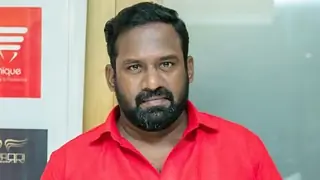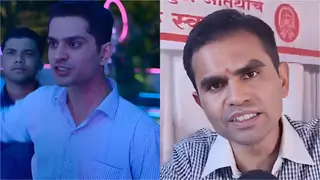The final week of PraShiv…
Two souls who began as mere fictional characters, yet somewhere along the way, walked quietly into our homes, our hearts, and became an inseparable emotion. They grew beyond the pages of a script, beyond the limits of a screen—into a bond we carried within us, a comfort we held close, a love we nurtured despite every flaw in the writing.
And now, as the time of parting draws near, the thought of separation from them leaves behind a dull, unshakable ache. How do we let go of something that became a part of us?
This week is not just their farewell—it is our celebration of PraShiv. The PraShiv we adored, the PraShiv we defended, the PraShiv who made us laugh, cry, ache, and believe. The PraShiv who, in all their imperfect perfection, became our most beautiful emotion.
So here’s to them… to our PraShiv. Always loved, always cherished, forever remembered...the characters we love and admire from the bottom of our heart 💜
Shivansh Randhawa – A Man Made of Fire and Fractures

Shivansh Randhawa is not simply a hero; he is a tapestry woven of contradictions — a man who carries the elegance of control on the outside, but within, is haunted by shadows that never left him.
At the core of Shivansh lies abandonment. The boy who once reached out for his mother and found only emptiness learned too early that love could leave, that trust could crumble, that home could become a hollow word. That wound hardened into arrogance, ambition, and ruthlessness — weapons he used to conquer the business world but shields he never put down even in his most intimate moments. His Bua Maa’s manipulations only deepened his blind spots, teaching him loyalty at the cost of clarity.

And yet, beneath this armor, there was always a child who still longed to be held. This is what makes Shivansh magnetic: his vulnerability is not erased by his strength, it is hidden within it.
When Prarthana entered his world, she did not see only the tycoon; she saw the man. And in loving her, Shivansh discovered what he thought was forever denied to him — the ability to trust again, to give without calculation, to feel without fear. For a man like Shivansh, love was not a casual offering; it was his deepest surrender. When he confessed, when he bared his pain, when he wept in her arms, it was monumental — because he had spent a lifetime believing he was undeserving of such solace.

But this very capacity to love also became his fragility. His love for Prarthana was fierce, desperate, and all-consuming — because she wasn’t just his wife, she was proof that he could still be chosen, still be worthy, still be healed. This is why her silences cut deeper than knives, why every perceived betrayal shattered not just his faith in her but in himself, in the possibility of goodness itself.
Shivansh is a man of words, often eloquent in his confessions, yet behind them lies a heart that trembles like a child’s. His nightmares — first of losing his mother, then of losing Prarthana — mirror his deepest fear: that love will always slip away from him, that he will always be left reaching for shadows.

And yet, what makes him unforgettable is not just his pain, but his perseverance. Despite the trauma, despite the betrayals, despite the loneliness — Shivansh still chooses love. He still reaches out. He still hopes. And that is what makes him more than a tragic figure; it makes him a testament to resilience, to the human longing for connection that refuses to die...
Shivansh Randhawa is not just a name — he is a presence, a storm that commands attention the moment he enters a frame. His style, his swag, his fire — they are not mere accessories to his persona, they are extensions of his soul. He walks into a room and the air shifts, not because of wealth or power alone, but because of the intensity that he radiates.
His style is sharp, calculated, yet effortless — tailored suits that don’t just drape his frame but armor him, eyes that burn with a fire unquenched, and a voice that can slice through silence with authority. He is not flamboyant; he doesn’t need to be. His aura is his crown, his unspoken charisma the weapon that makes others bend before he even raises his hand.

But beyond the polish lies the rawness — the fire born not of privilege, but of wounds. His swag is not arrogance, it is survival. His confidence is not inherited, it is carved out of battles fought in silence, out of the resolve to never let anyone see the trembling of the child within.
And when he loves, that very fire consumes. His passion is as fierce as his anger, his possessiveness as unyielding as his ambition. Shivansh Randhawa burns — in his pain, in his love, in his very existence — and whoever dares to stand close enough cannot help but feel the heat of a man who was broken, who rebuilt himself, and who now wears his scars as his most striking accessory.
Shivansh Randhawa has always been a storm contained in human form. The abandoned son, the boy who grew up with nothing but the taste of rejection, and the man who built walls so tall no one dared to cross them. Anger became his shield, arrogance his language, but loneliness was his constant companion. And yet, with Prarthana, we saw the cracks in his armor. We saw the man who trembled in nightmares, who longed to be held, who searched for a home not in bricks and walls but in her embrace. Shivansh’s journey was never about revenge or power — it was always about that silent, desperate craving for love he thought he’d never deserve...

He is also the man who carries regret like a second skin — not the loud, dramatic repentance of a soap-opera villain, but the small, relentless kind that lives in the margins of his days. He confesses in half-formed sentences to empty rooms, to pillows, to the dark; his apologies are whispered to the silence because often, that is the only witness he trusts. He accepts his mistakes not with theatrical absolution but with that raw, private humility that strips a man bare: a hand over his mouth, a breath held too long, the slow tallying of every moment he could have been kinder, braver, truer.
His contrition is a work of penance — he punishes himself with memory, replaying each fault until it is raw and insistent. Yet those quiet apologies, unheard by many, are not wasted: they imprint on the air between him and the ones he loves, felt more than said. They are the tiny, steady threads attempting to stitch what he’s torn — imperfect stitches, sometimes faltering, but honest. In that sorrowful honesty lies his gravest beauty: a man who knows the weight of what he’s done, who does not hide from it, and who, beneath the fury and the pride, keeps seeking a way back through the wreckage he made.

Shivansh Randhawa is both flame and fracture, arrogance and ache, storm and silence. He is the kind of character who stays with you not because he is perfect, but because he is human in the most heartbreaking and beautiful way.





















































2